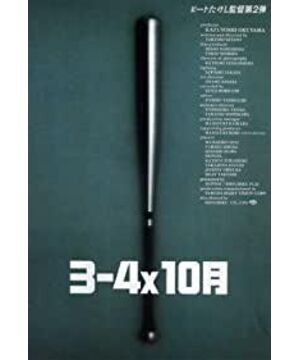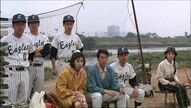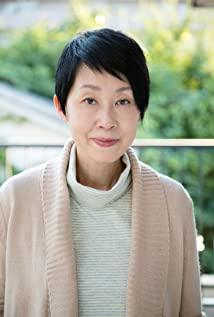There is too much to say about Kitano Takeshi, and I just talk about one of his movies here to express his admiration for Kitano Takeshi. For this movie, it was a movie shot in 1990. It is a film with a strong Kitano style, which tells the sad life of young people on the margins of society. It is full of violent aesthetics, full of oppression of women, full of heavy repression, of course, there is no lack of Kitano Takeshi's gray humor, which allows people to relax and adjust their minds for a moment in a suffocating environment.
The film always tells about the grievances and grievances in the Japanese underworld. It is the love between brothers and children, and the conflict of interests between the elder brother and the younger brother. No matter what, it is always performed in the structure of you killing me and my revenge. Full of Kitano-style violent aesthetic stories, with a strong atmosphere of Kitano. The film is about a young man who works at a gas station but loves baseball and offends the underworld because of his impulsive behavior. Because the underworld is so persistent, he has to ask his brother for help to settle the matter. Unfortunately, the elder brother was seriously injured. I heard my sister-in-law said that my eldest brother was going to Okinawa to buy a gun for revenge. So he and a good friend came to Okinawa alone, where they met and befriended the underworld brother played by Takeshi Kitano, and finally got the gun and started revenge. The story seems to be very simple, but the setting of Takeshi Kitano and the scheduling of the scenes made the film a bit more appealing. Perhaps the story of the film is not outstanding, but the director's way of telling is worthy of recognition. So the film arranged for the protagonist to walk out of the toilet in the baseball stadium for the beginning and the same for the protagonist to walk out of the toilet as the end. It seems to tell the audience: What you saw just now is just the subjective imagination of the protagonist in the movie, not true and credible. s story.
Of course, the portrayal of women in the film is just a symbol like in other films of his. It seems to be concealed and blurred in his films, always in a humble position. Although he couldn't receive the real love from the host, he still loved him and helped him as always. Perhaps this is inextricably linked to the Japanese cultural system. Therefore, in the film, the hero's girlfriend has almost no lines, always supporting what the hero wants to do. The boss played by Takeshi Kitano is always bullying his girlfriend. Iguchi treated his girlfriend so coldly. And these are enough to explain the director's weakening of women.
Of course, even if he is telling a very serious story about the underworld, the director still does not forget to include humorous shots in the film appropriately, in order to dilute the audience's sense of tension created by the serious and repressive atmosphere created in the film. On the baseball field, the eldest brother Iguchi chased after a player for a ball, and then sent a car to a young man without a driver’s license. The behavior of the young man. The two protagonists laughed at the beach when they met Takeshi Kitano. When they were eating in the restaurant, they shouted the black food and looked at each other. They accidentally went off when Kitano was in the underworld headquarters... All of this is so ridiculous that it can make the audience watch. I feel relaxed and happy in the shadows.
Of course, I still have some doubts in this film. There is a butterfly mark on the window of the underworld headquarters where Takeshi Kitano is located, and when the protagonist is about to leave Okinawa, the envelope given to them by Takeshi Kitano also has a butterfly on it, and the director is deep. Afraid that the audience would ignore this, but also deliberately used the protagonist’s dialogue to emphasize it. And here, the director thinks about what kind of feelings and thoughts we convey? Does it mean that things happen like the "butterfly effect"? Things that were originally small turned out to be intensified. Or does the director have special feelings for it? Or do you want to express a special meaning through this? The author does not know.
At the same time, in the author's opinion, the film is too "clean" in terms of environmental disposal. This is especially true in the handling of streets. When the protagonists walk on the streets, there are no other people. It seems that there is no other people in the world. The touching feeling is very blunt and too rigid. Perhaps the director is consciously creating a "closed environment" for the audience? Or do they have other profound intentions? Or was there really no one (the crowd) walked by at that time? No way? ! However, it seems to the author that this treatment is too artificial. If not, why are there so many people when the protagonist is at the station? This is where I think the director accidentally shines when shooting.
Of course, the sea is also the label of Takeshi Kitano. Whether it is this movie or his masterpiece "Hanaoka", whether it is "The Summer of That Year, Quiet Sea" or "Summer of Kikujiro" full of innocence and love, it is full of Shot of the blue sea. It seems that it symbolizes fraternity, tolerance, and... and this has become one of Kitano's symbols.
View more about Boiling Point reviews










